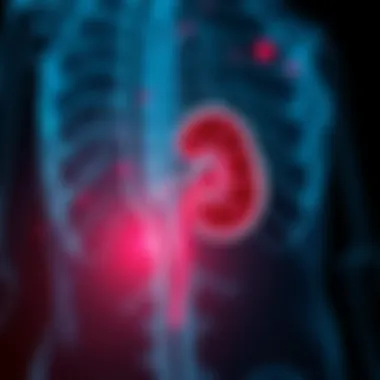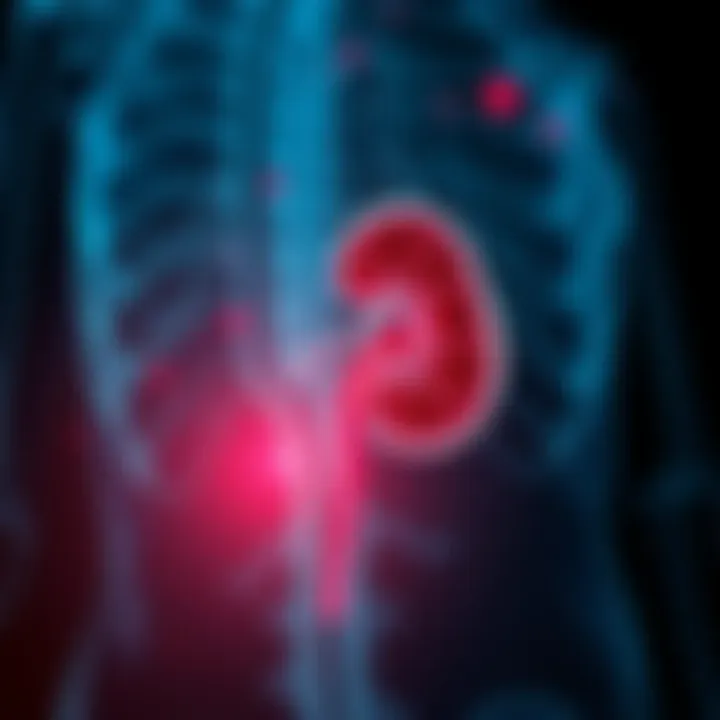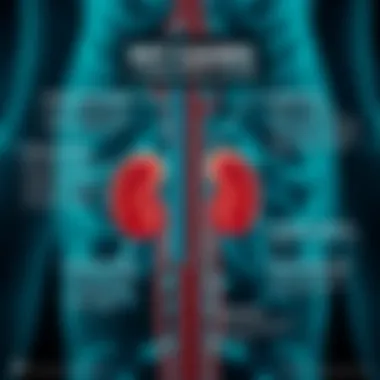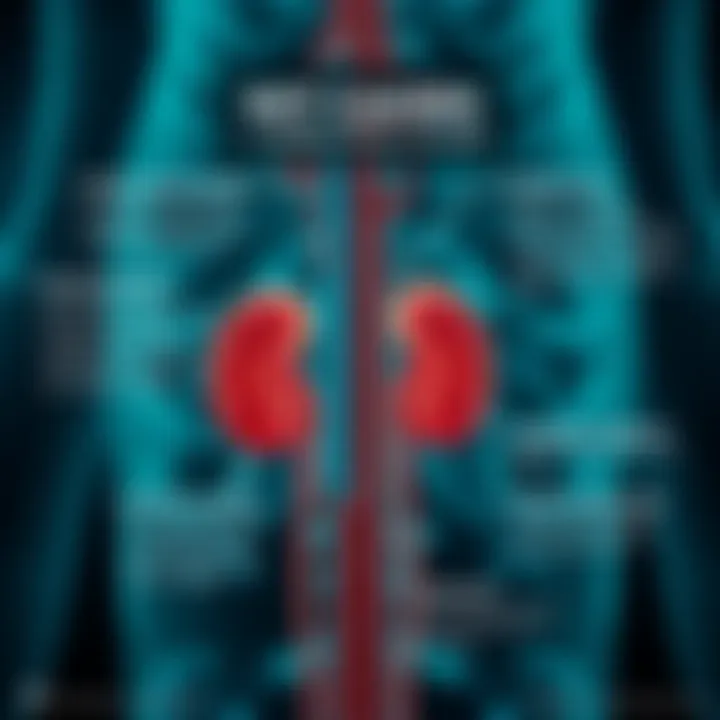Understanding Chronic Renal Failure and Its Impacts


Intro
Chronic renal failure, also recognized as chronic kidney disease (CKD), deserves a closer look, given its increasing prevalence and profound implications on health. This form of kidney dysfunction isn't just a medical concern; it's an intricate tapestry that weaves together various factors—from lifestyle choices to underlying medical conditions.
To grasp the magnitude of this issue, it’s essential to understand not just the what, but the why behind chronic renal failure. This conditions causes damage to the kidneys over time, impeding their ability to filter waste from the blood effectively. It’s a slow burner; you may not notice the signs until it’s progressed to a more critical stage, leaving lasting effects on multiple body systems.
As we delve into chronic renal failure, we will touch on its definitions, causes, diagnostic methods, and management strategies, unearthing each layer methodically. By providing readers with a comprehensive understanding, this article caters to students, researchers, educators, and professionals keen on deepening their knowledge of kidney health.
Defining Chronic Renal Failure
Chronic renal failure, often referred to as chronic kidney disease (CKD), is a gradual decline in kidney function over time. Understanding this condition is crucial not only for healthcare professionals but also for patients and their families as it sheds light on the structural and functional aspects of kidney health. Chronic renal failure leads to an array of implications for overall health, affecting multiple body systems and requiring comprehensive management. This section provides a detailed overview, focusing on the essential elements needed to grasp the significance of this condition.
Overview of Kidney Function
The kidneys, two bean-shaped organs located in the lower back, play a pivotal role in maintaining homeostasis in the body. Their primary functions include filtering waste products from the blood, balancing electrolytes, regulating blood pressure, and producing hormones that aid in red blood cell production and calcium metabolism. The functional units of the kidney, known as nephrons, are responsible for this complex interplay of tasks. Each kidney contains around a million nephrons, and their health is vital for the body to eliminate toxins.
When kidneys are functioning effectively, they maintain proper fluid balance and regulate vital salts and minerals, such as sodium, potassium, and calcium. However, when chronic renal failure sets in, these functions deteriorate, leading to an excess of waste and imbalances in electrolytes. This can cause various complications, underscoring the importance of early detection and management of kidney issues.
Pathophysiology of Chronic Renal Failure
The pathophysiological aspects of chronic renal failure involve a complex cascade of events. Initially, damage to the kidneys can stem from various underlying conditions such as diabetes mellitus and hypertension. Over time, persistent injury leads to the loss of functional nephrons, which not only decreases the kidneys' ability to filter blood but also triggers compensatory mechanisms in the remaining nephrons. This compensatory action may temporarily mask symptoms but ultimately increases the workload on these already stressed nephrons and facilitates further deterioration.
Furthermore, mechanisms such as glomerulosclerosis, tubular atrophy, and interstitial fibrosis play crucial roles in the progression of renal failure. In glomerulosclerosis, the glomeruli—tiny filtering units—become scarred and less reliable, compromising the filtration process. Tubular atrophy occurs when tubular cells degenerate, leading to impaired reabsorption and secretion functions, which bypasses normal waste elimination. This cycle creates a grim prognosis as kidney function deteriorates, creating an urgent need for effective management strategies to alleviate the risk of irreversible damage.
Understanding the pathophysiology of chronic renal failure allows healthcare providers to develop targeted interventions, thereby slowing disease progression and improving patients' quality of life.
Epidemiology and Prevalence
The exploration of epidemiology and prevalence in chronic renal failure provides an essential foundation for understanding the scope and impact of this condition. Recognizing how widespread chronic renal failure is can influence public health policies, guide resource allocation, and shape awareness campaigns. As the healthcare landscape evolves, grasping the statistical landscape is vital for addressing the challenges associated with kidney health comprehensively.
Global Statistics
Chronic renal failure remains a significant challenge worldwide. According to a report by the World Health Organization, it is estimated that around 13% of the global adult population suffers from some form of chronic kidney disease (CKD), which can lead to renal failure. A survey in Europe revealed interesting figures: the prevalence of advanced CKD among adults is close to 4%, drawing attention to the increasing necessity for screening and early interventions.
Moreover, certain regions show alarming statistics. For example, studies conducted in sub-Saharan Africa indicate that the prevalence can reach nearly 20%, highlighting disparities in healthcare access and resources. The following key points provide further insight into global statistics:
- Rising Incidence: The incidence of chronic renal failure has been on an upward trend, largely attributed to lifestyle factors such as increased obesity rates and sedentary habits.
- Mortality Rates: In the United States alone, chronic kidney disease is linked to approximately 50,000 deaths annually, with data showing that it poses more risk than some cancers.
- Cost Implications: The financial burden placed on healthcare systems globally to cope with CKD and its complications is staggering, often exceeding $40 billion in annual costs in the U.S. alone.
Demographics and Risk Factors
Understanding demographics and risk factors for chronic renal failure is paramount in tailoring prevention strategies and interventions. Some key demographics include:
- Age: Older adults are disproportionately affected, with the incidence sharply increasing in those over 65 years. This demographic shift calls for more targeted screening and education efforts.
- Gender: Research indicates that men are more likely to develop chronic renal failure, with some studies suggesting a 30% higher risk compared to women.
- Ethnic Backgrounds: Certain populations, including African Americans and Native Americans, show higher predisposition to kidney disease, necessitating culturally sensitive healthcare provisions.
In addition to demographics, several risk factors play a significant role in the development of chronic renal failure:
- Diabetes and Hypertension: These two conditions are leading contributors to kidney damage, with studies revealing that approximately 40% of patients with diabetes experience CKD.
- Family History: Individuals with a family history of renal disease are at elevated risk, suggesting a genetic component in susceptibility.
- Lifestyle Choices: Factors such as smoking, poor diet, and lack of physical activity can exacerbate risk, underscoring the importance of community education on healthy living.
Chronic renal failure doesn't just affect a few; its reach is broad, crossing borders and communities. Awareness of epidemiology and specific risk factors is crucial for combating this silent epidemic.
Etiology of Chronic Renal Failure
Understanding the causes of chronic renal failure is crucial, as it helps to unravel the intricate web of factors leading to this degenerative condition. Identifying these factors not only aids in early diagnosis but also paves the way for effective management strategies. By appreciating the multifaceted nature of etiology, health professionals can better tailor interventions that address specific patient needs. Furthermore, insights into the origins of kidney failure can spark preventative measures that might reduce incidence rates in at-risk populations.
Diabetes Mellitus
Diabetes mellitus stands as a leading contributor to chronic renal failure. High blood glucose levels from diabetes can damage blood vessels in the kidneys, impairing their function over time. The mechanism is quite straightforward: persistently elevated glucose levels lead to glomerulosclerosis, where the kidney's filtering units become hardened and scarred.


This condition doesn't usually announce itself, fostering a slow decline in kidney function that often goes unnoticed until it’s too late. Therefore, regular monitoring of kidney function in diabetic patients is paramount.
Key points to recognize about this etiology include:
- About 30-40% of people with diabetes eventually develop kidney disease.
- Management of diabetes can significantly slow the progression of renal impairment.
- Early detection with annual kidney function tests is encouraged.
Hypertension
Hypertension, or high blood pressure, is another significant risk factor for chronic renal failure. It's a silent killer – often asymptomatic yet with relentless damage. When blood pressure remains high, it places undue strain on the kidneys, leading to vascular damage that affects their filtering capacity.
In many cases, hypertension and kidney failure dance together, where kidney dysfunction can worsen blood pressure control, creating a vicious cycle. This symbiotic relationship highlights the importance of managing blood pressure effectively to preserve kidney health.
Studies show that controlling hypertension can lower the risk of kidney disease progression by over 50%.
Genetic Factors
Some individuals carry genetic predispositions that heighten their risk of developing chronic renal failure. Conditions like polycystic kidney disease illustrate this well, where inherited mutations lead to the formation of numerous cysts within the kidneys, ultimately compromising function.
Genetics can also influence how one's body responds to other risk factors, such as lifestyle or environmental factors. While these genetic factors cannot be changed, awareness can guide screening and early intervention strategies for at-risk families.
Lifestyle Contributions
Lifestyle choices often compound existing risks associated with kidney disease. Factors such as poor diet, lack of exercise, smoking, and excessive alcohol consumption can all contribute to conditions that predispose one to chronic renal failure.
For example, diets high in salt and unhealthy fats can lead directly to hypertension and diabetes, effectively acting as a gateway to more severe kidney issues. Conversely, adopting healthier habits—such as integrating physical activity, maintaining a balanced diet, and avoiding harmful substances—can have a protective effect on kidney health.
In summary, understanding the etiology of chronic renal failure extends beyond individual factors. It encompasses an intricate interplay of genetics, lifestyle, and other health conditions, necessitating a multi-faceted approach to prevention and management. Addressing these areas can make substantial strides in improving outcomes and preserving kidney function in vulnerable populations.
Clinical Manifestations
The importance of understanding clinical manifestations in chronic renal failure cannot be overstated. This segment acts as an essential bridge between the underlying factors of kidney disease and the broader picture of patient care. Recognizing the clinical signs and symptoms is crucial not only for timely diagnosis but also for effective management. In chronic renal failure, changes in kidney function can lead to a myriad of complications, some of which can be life-threatening if not addressed swiftly.
Unpacking these manifestations gives patients, caregivers, and healthcare professionals insight into the overall health trajectory. The more informed one is about the symptoms, the better prepared they are to engage in proactive management strategies. It also aids in recognizing when to seek medical assistance, thus potentially averting severe complications that may arise from delayed intervention.
Symptoms of Kidney Dysfunction
Kidney dysfunction can reveal itself through a range of symptoms, some of which may be subtle and others overt. Common symptoms include:
- Fatigue and weakness,
- Swelling in the legs, ankles, or feet,
- Changes in urination patterns, such as frequency or volume,
- Shortness of breath,
- Nausea and vomiting,
- Persistent itching,
- Mental confusion or difficulty concentrating.
These symptoms might evolve gradually, making it easy for individuals to dismiss them as mere signs of aging or fatigue. However, careful observation can serve as an early warning system. The urinary symptoms, for instance, are particularly telling; patients may notice either a decrease in urine output or an increase in frequency of visits to the bathroom at night—termed nocturia.
Additionally, the systemic effects of renal dysfunction can encompass other bodily systems, leading to anemia and cardiovascular complications. For example, the harmful buildup of toxins can elevate blood pressure and contribute to heart disease—twin issues often exacerbating each other.
"Recognizing these symptoms early can mean the difference between a manageable condition and a life-threatening situation."
Complications Associated with Chronic Renal Failure
As chronic renal failure progresses, various complications may arise, each posing its own risks and challenges. Some significant complications include:
- Cardiovascular disease: Patients with renal failure frequently experience heart issues due to the interplay between high blood pressure and fluid overload, which can strain the heart.
- Bone disease: The kidneys play a crucial role in activating vitamin D, which affects calcium balance and bone health. Kidney impairment can lead to mineral and bone disorders, increasing fracture risk.
- Electrolyte imbalances: Elevated potassium levels (hyperkalemia) are a common concern in renal failure, potentially leading to dangerous heart rhythm abnormalities.
- Acid base imbalance: Metabolic acidosis can occur as kidneys lose their ability to excrete hydrogen ions and reabsorb bicarbonate effectively.
- Gastrointestinal issues: Many patients encounter gastrointestinal complications ranging from nausea to gastrointestinal bleeding, which can stem from renal failure itself or the treatments involved.
These complications highlight the interconnected nature of kidney health with overall bodily functions. The more crucial the kidneys are for regulating bodily systems, the clearer it becomes how renal failure echoes through other health domains, increasing the burden on both healthcare systems and patients. Ultimately, awareness and early recognition of these clinical manifestations and their associated complications pave the way for better patient outcomes and improved quality of life.
Diagnosis of Chronic Renal Failure
Diagnosing chronic renal failure requires a careful orchestration of clinical acumen and laboratory tests. Early diagnosis is crucial, as it can significantly alter the management approach and slow disease progression. Timely identification allows healthcare providers to implement strategies that preserve kidney function and prevent complications, fostering better outcomes for patients. This section will clarify the methods used to diagnose this condition and their implications.
Laboratory Tests and Biomarkers


Laboratory tests are the backbone of diagnosing chronic renal failure. The most salient blood test is the serum creatinine measurement. Creatinine is a waste product formed from muscle metabolism, and when kidneys start failing, its levels rise in the blood. Thus, tracking serum creatinine is essential in assessing glomerular filtration rate (GFR). GFR is the best reflection of kidney function.
In addition to creatinine, blood urea nitrogen (BUN) is also evaluated. Elevated BUN levels can indicate a reduction in kidney function, but it is worth noting that other factors such as dehydration can influence these results. Therefore, this test alone does not provide a full perspective.
Furthermore, other biomarkers such as albumin, a protein that can leak into the urine when kidneys are damaged, are also indicative. The presence of microalbuminuria can signal early renal damage before creatinine levels rise significantly. Recognizing such markers offers a chance for early intervention, which can be pivotal in managing the disease effectively.
"Early detection of kidney dysfunction can lead to tailored therapeutic strategies, improving survival rates and quality of life."
Additionally, tests like electrolyte panels can give insights on critical minerals controlled by kidneys, such as sodium and potassium. Anomalies in these levels may suggest further kidney impairment or complications. Overall, the combination of these tests provides a comprehensive picture of renal health, making it easier to diagnose chronic renal failure.
Imaging Techniques
While laboratory tests paint a vivid picture of kidney function, imaging techniques complement these findings by revealing structural anomalies within the kidneys. Ultrasound is one of the most commonly used modalities. This non-invasive technique allows for the visualization of kidney size, shape, and presence of structural abnormalities, such as cysts or obstructions.
In some cases, computed tomography (CT) scans may be used. CT imaging provides much more detailed pictures and can help diagnose complications such as kidney stones or tumors that may be contributing to renal impairment. Although it exposes the patient to radiation, its benefits in assessing kidney structure can far outweigh the risks, especially when urgent diagnosis is required.
Lastly, magnetic resonance imaging (MRI) can be advantageous in specific scenarios where soft tissue differentiation is critical, providing insights without radiation exposure. The choice of imaging technique heavily depends on the clinical situation, but they all serve to enhance understanding by providing a visual context to the biochemical findings.
In summary, diagnosing chronic renal failure involves a robust interplay between laboratory tests and imaging techniques. Each method sheds light on different aspects of kidney health, enabling healthcare professionals to craft a patient-centric approach to treatment.
Management Strategies
Effective management of chronic renal failure is crucial to mitigating its effects on overall health and quality of life. The complexities of this condition necessitate an integrated approach encompassing pharmacological, nutritional, and procedural interventions to manage symptoms and optimize kidney function. Proper management strategies can greatly improve patient outcomes and extend the progression of the disease.
Pharmacological Approaches
Pharmacological interventions are at the forefront of managing chronic renal failure. Medications play a vital role in addressing underlying conditions such as diabetes and hypertension, which are common culprits in the progression of kidney disease.
Blood pressure control is particularly important. Agents like ACE inhibitors and angiotensin receptor blockers are often prescribed. These not only help lower blood pressure but also offer protective benefits to the kidneys by reducing strain on the renal vasculature. Additionally, diuretics may be utilized to manage fluid overload, which is a common concern for patients with reduced kidney function.
Moreover, erythropoiesis-stimulating agents can be prescribed to combat anemia often associated with chronic renal failure. Keeping hemoglobin levels within target ranges becomes essential to maintain overall energy and avoid fatigue. Regular monitoring through blood tests ensures that dosage adjustments can be made promptly, enhancing patient safety and responsiveness to treatment.
Nutritional Management
Dietary management is a cornerstone in the arsenal for combatting chronic renal failure. Specific nutritional strategies are essential to minimize kidney toxins and maintain an optimal balance of nutrients. A dietitian experienced in renal nutrition can help create tailored meal plans that accommodate individual needs.
The primary focus in dietary management is often on protein restriction. Reducing protein intake can decrease the workload on the kidneys. Patients might also need to limit sodium, potassium, and phosphorus to help manage fluid levels and prevent complicating conditions. Consider the following dietary tips:
- Why choose low-sodium foods? Salt can exacerbate hypertension and fluid retention.
- Incorporate potassium management: Foods high in potassium, such as bananas and oranges, may need to be curtailed if renal function is significantly compromised.
- Phosphorus control is critical: High phosphorus levels can cause bone and heart issues, necessitating careful selection of dairy and legumes.
Dialysis Options
Dialysis serves as a lifeline for many suffering from advanced chronic renal failure. It replaces some of the kidney's essential functions, particularly waste removal, which becomes impaired in the disease’s later stages. Two primary forms of dialysis are available: hemodialysis and peritoneal dialysis.
- Hemodialysis involves the use of a machine that filters blood and removes waste products. This typically requires the patient to visit a clinic several times a week.
- Peritoneal dialysis, on the other hand, utilizes the lining of the abdomen as a natural filter. It can be performed at home and often offers more flexibility and autonomy to patients.
Deciding on a dialysis option involves consideration of the patient’s lifestyle, health status, and personal preference. Education about each method is pivotal, enabling patients to make informed choices about their care.
Kidney Transplantation Considerations
When it comes to managing chronic renal failure, kidney transplantation presents itself as the most definitive treatment. However, it is not a one-size-fits-all solution. The transplant process involves significant evaluation and is subject to various factors, including:
- Compatibility: Finding a donor that matches the patient’s blood type and tissue type is critical.
- Immunosuppression: Post-transplant, patients must adhere to immunosuppressive therapies to prevent rejection of the donor organ.
- Long-term commitments: Regular follow-up care and adherence to prescribed medications are vital for maintaining kidney health after transplant.
The potential benefits of transplantation, including a significant improvement in quality of life and life expectancy, often outweigh the drawbacks. Patients should be counseled effectively about the expectations, advantages, and challenges involved with this option.
Effective management of chronic renal failure hinges on a multidisciplinary approach. Integrating medical, nutritional, and psychosocial strategies is essential to address the varied needs of patients and optimize outcomes.


Patient Support and Education
The journey through chronic renal failure can be a challenging one, not just for the patient but for their families as well. Understanding the importance of patient support and education is crucial in navigating this complex medical landscape. Lack of knowledge can exacerbate feelings of anxiety and helplessness, while well-informed patients often experience better health outcomes. Education empowers individuals to take an active role in managing their condition and understanding what is at stake.
Engaging with patients about their diagnosis fosters a sense of agency. When patients are informed about their illness, they are more likely to comply with treatment regimens and make dietary choices that could positively impact their kidney health. This support helps in creating a partnership between healthcare providers and patients, enhancing the overall experience and effectiveness of treatment.
Psychosocial Aspects
The psychosocial one in the realm of chronic renal failure cannot be overlooked. Patients grappling with this condition frequently encounter a medley of emotional responses ranging from depression and anxiety to isolation. The very nature of a chronic disease implies ongoing challenges, creating a state of uncertainty about the future. Patients may feel like they are carrying a heavy backpack filled with worries, which can adversely affect their mental and emotional well-being.
Coping mechanisms vary notably. Engaging with peer support groups, for instance, can provide immense relief. Such groups offer a safe harbor for individuals to share their experiences and feelings. Beyond that, connecting with family and friends can serve as a vital support structure. It’s invaluable when loved ones are aware of the situation and can provide compassion and understanding. Addressing these psychological needs is integral, for a positive mindset can significantly influence one's response to treatment.
Resources for Patients and Families
Navigating the waters of chronic renal failure requires not just medical treatment but access to various resources that provide vital support. Here are some helpful avenues to explore:
- Educational Websites: Trusted resources such as the National Kidney Foundation (www.kidney.org) and the American Association of Kidney Patients (www.aakp.org) are excellent for finding up-to-date information about kidney health, dietary guidelines, and coping strategies.
- Support Groups: Online platforms like Reddit have dedicated forums for chronic kidney disease patients where individuals can share their stories and advice. Finding a local support group can also be invaluable for face-to-face interaction.
- Counseling Services: Mental health professionals who specialize in chronic illness can provide crucial strategies to manage stress, anxiety, and depression. Many hospitals offer these services.
- Patient Advocacy Organizations: These groups work tirelessly on behalf of patients to ensure their needs are met and that they have access to the resources they require. Advocacy agencies can provide help navigating insurance challenges and accessing necessary medications.
By utilizing these resources, patients and their families can construct a comprehensive support network that addresses both medical and emotional aspects of chronic renal failure. With the right support and education, the burden of this condition can feel a bit lighter.
Research and Future Directions
Research and future directions surrounding chronic renal failure (CRF) are pivotal for the evolution of treatment options and the overall management of patients suffering from this condition. As clinical understandings deepen, it becomes essential to identify and explore innovative approaches that can improve patient outcomes and quality of life. The importance of continued research in this field cannot be overstated; it includes not only advancements in pharmacological treatments but also innovations in technology, genetic studies, and lifestyle interventions.
The landscape of chronic renal failure is rapidly shifting, with new research shedding light on previously unexplored avenues. Recent studies emphasize the potential of personalized medicine, where treatment plans are tailored to the individual characteristics of each patient. This approach could lead to more effective interventions and a fundamental change in how the condition is managed.
"Without research, our understanding of chronic renal failure would stagnate, hindering the development of life-saving treatments."
Additionally, ongoing investigations into the pathophysiology of CRF are revealing a multitude of factors that complicate this condition. For instance, understanding the metabolic and inflammatory processes involved can illuminate why certain patients respond poorly to conventional therapies. This understanding not only aids in refining existing treatments but also in introducing new modalities that may not have been previously considered.
Recent Advances in Treatment
The last few years have witnessed considerable progress in the treatment of chronic renal failure. One notable advance is the emergence of novel pharmacological agents designed to protect renal function. Medications like Sodium-glucose co-transporter 2 (SGLT2) inhibitors have changed the game by not only lowering blood sugar in diabetic patients but also providing protective benefits to the kidneys.
Additionally, mineralocorticoid receptor antagonists are being adapted for use in CRF, showing promise in reducing proteinuria, a frequent marker of kidney damage. Beyond pharmaceuticals, dietary advancements have also been noted. Dietitian-led strategies tailored for kidney health are gaining traction, focusing on nutrient restrictions and balanced intake that support kidney function while also catering to the overall well-being of patients.
Technological approaches are also on the rise. Tools for remote monitoring of kidney function are helping healthcare professionals track patient status in real-time, allowing for quicker adjustments to treatment plans. This kind of integration of technology not only enhances patient safety but can also lead to improved adherence to treatment regimens.
Ongoing Clinical Trials
Ongoing clinical trials are essential for validating new treatments and approaches in chronic renal failure. Numerous studies are currently examining the efficacy and safety of emerging therapies. These trials are crucial for testing both new drugs and potential lifestyle modifications, which could become part of standard care practices.
Some key areas of research in current clinical trials include:
- Gene Therapy: Exploring the possibility of correcting genetic defects responsible for kidney impairments.
- Immunomodulatory Therapies: Assessing treatments that can alter the immune response in kidney disease, aiming to slow down the progression of CRF.
- Combination Therapies: Investigating the effects of combining existing drugs in ways that have not yet been rigorously tested.
With each trial, researchers gather vital data that can reshape the understanding of chronic renal failure and its treatment landscape. The collaboration between academic institutions, pharmaceuticals, and research organizations highlights the commitment to finding more effective interventions for affected patients. By focusing on these fronts, the medical community has the potential to turn the tide against chronic renal failure, moving towards a future where kidney health can be preserved and enhanced.
Culmination
Chronic renal failure, characterized by a gradual decline in kidney function, calls for significant attention in both academic and practical settings. This concluding section provides a nuanced understanding of the topic, reinforcing its importance and identifying future considerations.
Summary of Key Points
In examining chronic renal failure, several key elements emerged that are critical to comprehending this complex condition:
- Definition and Pathophysiology: Chronic renal failure involves a progressive loss of kidney function, often linked to underlying disorders like diabetes or hypertension. Recognizing its pathophysiological mechanisms is crucial for effective diagnosis and management.
- Epidemiological Insights: The prevalence of chronic renal failure varies globally and is influenced by demographic factors. Understanding these variations can help inform preventive measures.
- Etiological Factors: Factors such as diabetes, hypertension, and certain genetic predispositions play pivotal roles in the development of this condition. Lifestyle choices, including diet and physical activity, also contribute significantly.
- Clinical Manifestations: Patients may exhibit a range of symptoms, from fatigue to complications affecting various organ systems, underscoring the multifaceted nature of this disease.
- Diagnostic Strategies: A combination of laboratory tests and imaging techniques aids in establishing a diagnosis, while continual monitoring is essential for effective management.
- Management Approaches: Treatment can include pharmacological options, nutritional changes, dialysis, and, in some cases, kidney transplantation. Patients require comprehensive care tailored to their individual needs.
- Supportive Resources: Education and psychosocial support are vital to empower patients and their families while navigating the challenges of chronic renal failure.
Implications for Future Research
Looking forward, the landscape of chronic renal failure management is evolving. Research efforts are aimed at several critical areas:
- Innovative Treatment Modalities: Advances in pharmacology, including novel medications, hold promise for improving outcomes for patients suffering from chronic renal failure. The potential for gene therapy also raises exciting prospects for addressing underlying genetic conditions.
- Understanding Disease Progression: Investigating why some patients experience slower disease progression while others deteriorate rapidly can lead to tailored treatment strategies, enhancing individualized patient care.
- Preventive Strategies: Increasing focus on lifestyle interventions and preventative measures is essential. This includes understanding how diet, exercise, and community health initiatives can collectively lower the incidence of chronic renal failure.
- Education and Awareness: Further studies are needed to gauge the effectiveness of patient education programs in improving health outcomes. Awareness campaigns could play a pivotal role in encouraging early detection of risk factors.
"Knowledge is power, and in the case of chronic renal failure, it can also be a lifesaver."







